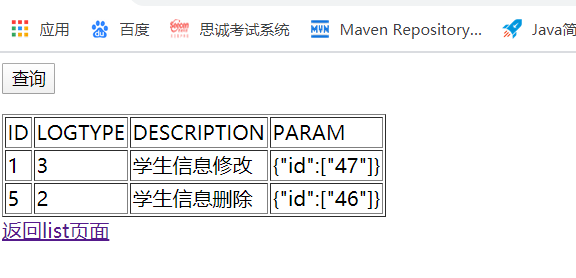SSM框架把日志信息保存到数据库过程详解
更新时间:2020年07月01日 10:57:52 作者:等你的夏天
这篇文章主要介绍了SSM框架把日志信息保存到数据库过程详解,文中通过示例代码介绍的非常详细,对大家的学习或者工作具有一定的参考学习价值,需要的朋友可以参考下
1)在service层和mapper层中写一个插入方法和查询方法;
我们先写一个日志类;定义属性;并且要在数据库中建好表;

package entity;
public class Log {
private Integer id;
private Integer logtype;
private String description;
private String param;
public Log(){
}
public Log(Integer id, Integer logtype, String description, String param) {
this.id = id;
this.logtype = logtype;
this.description = description;
this.param = param;
}
@Override
public String toString() {
return "Log{" +
"id=" + id +
", logtype=" + logtype +
", description='" + description + '\'' +
", param='" + param + '\'' +
'}';
}
public Integer getId() {
return id;
}
public void setId(Integer id) {
this.id = id;
}
public Integer getLogtype() {
return logtype;
}
public void setLogtype(Integer logtype) {
this.logtype = logtype;
}
public String getDescription() {
return description;
}
public void setDescription(String description) {
this.description = description;
}
public String getParam() {
return param;
}
public void setParam(String param) {
this.param = param;
}
}
该写方法了
1、logService.java页面;
public interface LogService {
int insert(Log log);
List<Log> findAll();
}
2、logServiceImpl.java页面;
@Service
public class LogServiceImpl implements LogService {
@Autowired
private LogMapper logMapper;
@Override
public int insert(Log log) {
int i=logMapper.insert(log);
return i;
}
@Override
public List<Log> findAll() {
List<Log> logs=logMapper.findAll();
return logs;
}
}
3、logMapper.java页面:
public interface LogMapper {
int insert(Log log);
List<Log> findAll();
}
4、logMapper.xml页面;
<?xml version="1.0" encoding="UTF-8"?>
<!DOCTYPE mapper PUBLIC "-//mybatis.org//DTD Mapper 3.0//EN" "http://mybatis.org/dtd/mybatis-3-mapper.dtd">
<mapper namespace="mapper.LogMapper">
<insert id="insert">
<selectKey keyProperty="id" resultType="integer" order="BEFORE">
select seq_logaspect.nextval from dual
</selectKey>
insert into logaspect(id,logtype,description,param) values (#{id},#{logtype},#{description},#{param})
</insert>
<select id="findAll" resultType="entity.Log">
select * from logaspect
</select>
</mapper>
5、由于我们打印日志是通过切面,所以我们写一个切面类;
package aop;
import com.fasterxml.jackson.core.JsonProcessingException;
import com.fasterxml.jackson.databind.ObjectMapper;
import entity.Log;
import entity.Student;
import org.apache.log4j.LogManager;
import org.apache.log4j.Logger;
import org.aspectj.lang.JoinPoint;
import org.aspectj.lang.Signature;
import org.aspectj.lang.annotation.Aspect;
import org.aspectj.lang.annotation.Before;
import org.aspectj.lang.annotation.Pointcut;
import org.aspectj.lang.reflect.MethodSignature;
import org.springframework.beans.factory.annotation.Autowired;
import org.springframework.stereotype.Component;
import org.springframework.web.context.request.RequestContextHolder;
import org.springframework.web.context.request.ServletRequestAttributes;
import service.LogService;
import javax.servlet.http.HttpServletRequest;
import javax.servlet.http.HttpSession;
import java.lang.annotation.Annotation;
import java.lang.reflect.Method;
import java.util.Map;
@Component//对象由spring管理
@Aspect//切面注解
public class LogAspect {
@Autowired
private LogService logService;
private static final Logger LOGGER = LogManager.getLogger(LogAspect.class);
//定义切入点,切入到添加了LogData注解的方法上
@Pointcut("@annotation(aop.LogData)")
public void pointCut(){
}
/**
* 记录日志的切面方法
* 在该方法中定义统一的日志记录逻辑
* @param joinPoint
*/
@Before("pointCut()")
public void log(JoinPoint joinPoint){
System.out.println("进入日志Aspect");
//获取到方法签名
MethodSignature signature= (MethodSignature) joinPoint.getSignature();
//获取到连接点方法对象
Method method=signature.getMethod();
//获取方法上面特定的注解
LogData annotation=method.getAnnotation(LogData.class);
LogType logType=annotation.logType();
String description=annotation.description();
LOGGER.info("获取到注解内容:logType="+logType.getType()
+",description:"+description);
//aop中获取request
ServletRequestAttributes requestAttributes= (ServletRequestAttributes) RequestContextHolder.getRequestAttributes();
HttpServletRequest request=requestAttributes.getRequest();
HttpSession session=request.getSession();
//获取操作人
Student student= (Student) session.getAttribute("student");
//获取请求数据
Map<String,String[]> parameterMap=request.getParameterMap();
//将对象转换成json字符串==>存储到请求数据字段中
//jackSon json字符串操作
ObjectMapper objectMapper=new ObjectMapper();
try {
String s=objectMapper.writeValueAsString(parameterMap);
LOGGER.info("请求数据:"+s);
Log log = new Log();
log.setLogtype(logType.getType());
log.setDescription(description);
log.setParam(s);
logService.insert(log);
} catch (JsonProcessingException e) {
e.printStackTrace();
}
//todo 将日志信息保存到数据库 LogController service mapper jsp
}
}
6、写一个loglist.jsp页面来展示信息;
<%@ page contentType="text/html;charset=UTF-8" language="java" isELIgnored="false"%>
<%@ taglib prefix="c" uri="http://java.sun.com/jsp/jstl/core" %>
<html>
<head>
<title>用户列表</title>
</head>
<body>
<form action="${pageContext.request.contextPath}/user/selAll">
<input type="submit" value="查询">
</form>
<table border="1px">
<thead>
<tr>
<td>ID</td>
<td>LOGTYPE</td>
<td>DESCRIPTION</td>
<td>PARAM</td>
</tr>
</thead>
<tbody>
<c:forEach var="log" items="${logs}">
<tr>
<td>${log.id}</td>
<td>${log.logtype}</td>
<td>${log.description}</td>
<td>${log.param}</td>
</tr>
</c:forEach>
</tbody>
</table>
<a href="${pageContext.request.contextPath}/user/list" rel="external nofollow" >返回list页面</a>
</body>
</html>
7、最后,我们写一个控制层的方法;
package controller;
import aop.LogData;
import aop.LogType;
import com.github.pagehelper.PageHelper;
import com.github.pagehelper.PageInfo;
import entity.Log;
import entity.Student;
import mapper.StudentsMapper;
import org.apache.log4j.LogManager;
import org.apache.log4j.Logger;
import org.springframework.beans.factory.annotation.Autowired;
import org.springframework.stereotype.Controller;
import org.springframework.ui.Model;
import org.springframework.ui.ModelMap;
import org.springframework.web.bind.annotation.ModelAttribute;
import org.springframework.web.bind.annotation.RequestMapping;
import org.springframework.web.bind.annotation.RequestParam;
import service.LogService;
import service.StudentService;
import javax.servlet.http.HttpServletRequest;
import javax.servlet.http.HttpSession;
import java.util.HashMap;
import java.util.List;
/**
* 控制层调service,service调dao层
*/
@Controller
@RequestMapping("/user")
public class UserController {
//定义日志对象
//private static final Logger logger= LogManager.getLogger(UserController.class);
@Autowired
private StudentService studentService;
@Autowired
private LogService logService;
@RequestMapping("/list") //@ModelAttribute(name = "params") :向request域中存值
public String list(ModelMap modelMap,@RequestParam HashMap<String,Object> map){
//定义debug级别的日志
//logger.debug("前台传递的查询条件:"+map);
//logger.info("info级别日志:"+map);
System.out.println("前台传递的查询条件:"+map);
//List<Student> students = studentService.findAll();
// List<Student> students = studentService.findByMap(map);
// modelMap.put("students",students);
PageInfo<Student> page = studentService.findByPage(map);
//记录error级别日志
//logger.error("查询到分页数据:"+page);
System.out.println("查询到分页数据:"+page);
modelMap.put("page",page);
modelMap.put("params",map);//将查询条件回传到页面,用于回显查询条件
return "list.jsp";
}
@LogData(logType = LogType.DELETE,description = "学生信息删除")
@RequestMapping("/delete")
public String delete(Integer id){
studentService.delete(id);
return "redirect:list";
}
@LogData(logType = LogType.UPDATE,description = "学生信息修改")
@RequestMapping("/update2")
public String update2(Integer id,ModelMap modelMap){
Student student = studentService.selectById(id);
modelMap.put("student",student);
return "update.jsp";
}
//根据是否存在id值,来判断是执行新增还是修改操作
@RequestMapping("/update")
public String update(Student student){
studentService.update(student);
return "redirect:list";
}
@LogData(logType = LogType.INSERT,description = "学生信息新增")
@RequestMapping("/insert")
public String insert(Student student){
studentService.insert(student);
return "redirect:list";
}
@Autowired
private StudentsMapper studentsMapper;
@RequestMapping("list2")
public String list2(ModelMap modelMap){
PageHelper.startPage(1,5);
List<Student> students=studentsMapper.selectAll();
modelMap.put("students",students);
PageInfo<Student> pageInfo=new PageInfo<>(students);
System.out.println(pageInfo);
return "list.jsp";
}
@RequestMapping("/selAll")
public String findAll(ModelMap modelMap){
List<Log> logs = logService.findAll();
modelMap.put("logs",logs);
return "loglist.jsp";
}
}
测试结果,我们出来的页面效果是:

即说明打印日志成功了;
以上就是本文的全部内容,希望对大家的学习有所帮助,也希望大家多多支持脚本之家。
相关文章

Struts2中Action中是否需要实现Execute方法
这篇文章主要介绍了Struts2中Action中是否需要实现Execute方法的相关资料,需要的朋友可以参考下2016-03-03
IDEA利用自带Axis工具和wsdl文件反向生成服务端客户端代码图文详解
这篇文章主要介绍了IDEA利用自带Axis工具和wsdl文件反向生成服务端客户端代码详细流程,在这里小编使用的是idea2021.1最新开发工具,本文通过图文并茂的形式给大家介绍的非常详细,需要的朋友可以参考下2021-05-05
Java使用Soap方式调用WebService接口代码示例
Java调用WebService接口是指通过Java语言来访问并与WebService进行交互,WebService是一种基于Web的服务架构,它通过标准的XML和HTTP协议来提供服务,这篇文章主要给大家介绍了关于Java使用Soap方式调用WebService接口的相关资料,需要的朋友可以参考下2024-03-03












最新评论